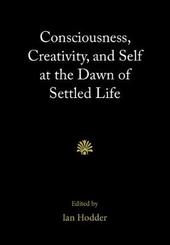
|
Consciousness, Creativity, and Self at the Dawn of Settled Life
Hardback
Main Details
| Title |
Consciousness, Creativity, and Self at the Dawn of Settled Life
|
| Authors and Contributors |
Edited by Ian Hodder
|
| Physical Properties |
| Format:Hardback | | Pages:304 | | Dimensions(mm): Height 260,Width 183 |
|
| Category/Genre | Prehistoric archaeology
Egyptian archaeology and Egyptology |
|---|
| ISBN/Barcode |
9781108484923
|
| Classifications | Dewey:939.4 |
|---|
| Audience | | Professional & Vocational | |
|---|
| Illustrations |
Worked examples or Exercises; 3 Tables, black and white; 32 Halftones, black and white; 18 Line drawings, black and white
|
|
Publishing Details |
| Publisher |
Cambridge University Press
|
| Imprint |
Cambridge University Press
|
| Publication Date |
5 March 2020 |
| Publication Country |
United Kingdom
|
Description
Over recent years, a number of scholars have argued that the human mind underwent a cognitive revolution in the Neolithic. This volume seeks to test these claims at the Neolithic site of Catalhoeyuk in Turkey and in other Neolithic contexts in the Middle East. It brings together cognitive scientists who have developed theoretical frameworks for the study of cognitive change, archaeologists who have conducted research into cognitive change in the Neolithic of the Middle East, and the excavators of the Neolithic site of Catalhoeyuk who have over recent years been exploring changes in consciousness, creativity and self in the context of the rich data from the site. Collectively, the authors argue that when detailed data are examined, theoretical evolutionary expectations are not found for these three characteristics. The Neolithic was a time of long, slow and diverse change in which there is little evidence for an internal cognitive revolution.
Author Biography
Ian Hodder is Dunlevie Family Professor at Stanford University, California, and Director of the Stanford Archaeology Center. He is the author and editor of many books, most recently Religion in the Emergence of Civilization (2010), Entangled: An Archaeology of the Relationships between Humans and Things (2012), and Religion at Work in Neolithic Society (Cambridge, 2014).
Reviews'... an introduction by Hodder (Stanford Univ.), which presents the central problem of paleocognition and the Catalhoeyuk site, the cognitive scientists consider whether cultural change could cause or encourage cognitive change, while the archaeologists look at various classes of artifacts and their distributions in time and space at Catalhoeyuk and other Neolithic sites in the Near East to see if their changes could be related to cognitive changes in the people who made and used them.' L. L. Johnson, Association of American Publishers
|